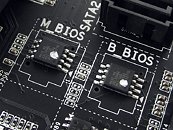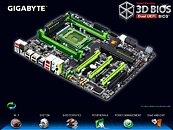- Joined
- May 14, 2004
- Messages
- 28,494 (3.73/day)
| Processor | Ryzen 7 5700X |
|---|---|
| Memory | 48 GB |
| Video Card(s) | RTX 4080 |
| Storage | 2x HDD RAID 1, 3x M.2 NVMe |
| Display(s) | 30" 2560x1600 + 19" 1280x1024 |
| Software | Windows 10 64-bit |
Current AMD AM4 motherboards basically support four platforms at the moment: the new Ryzen 2000 processors, Ryzen 2000 G APUs with integrated graphics, 1st generation Ryzen and Bristol Ridge. Bristol Ridge was AMD's last processor generation before Ryzen was released. Bristol Ridge introduced Socket AM4, which according to AMD has a lifespan beyond 2020. According to Anandtech, several motherboard manufacturers are now reporting that they might drop support for Bristol Ridge in their future motherboard releases. The underlying reason is that in addition to the setup interface, and UEFI with its driver and network stack, the BIOS has to support all processors by including microcode for them.
Supporting so many CPU models bloats the size of the BIOS beyond 128 megabits (16 MB), which would exceed the capacity of the BIOS flash chips used by most vendors and force them to use higher capacity models, ie 256 megabits. As always in this industry, the issue here comes down to pricing.

A 128 Mb flash chip costs less than half as much as a 256 Mb chip - a cost that motherboard vendors seem reluctant to cover, especially considering the limited commercial success of Bristol Ridge. We're talking about $3-4 price differences here, which sounds like nothing at first, but will add up with millions of motherboards shipped. Also these few dollars could make you lose a price advantage over a competitor.
There is no question that the vast majority of processors used on AM4 motherboards will be Ryzen; the only mention of Bristol Ridge that I've seen in recent times is, ironically, that the processor that AMD ships to users to upgrade their BIOS for Ryzen support is Bristol Ridge, as that's the cheapest way to get an AM4 system up and running. So the reality is that Bristol Ridge support will be irrelevant for 99% of future AM4 motherboards.
Instead of dropping Bristol support, motherboard vendors could release special BIOS versions that support only Bristol Ridge, but not Ryzen, and vice versa. This seems highly unlikely as it would significantly increase complexity for qualification and maintenance of the BIOS and the chances of people flashing the wrong BIOS version would be high, too. Maybe we could see a reduction in the BIOS fanciness that we saw with the introduction of UEFI. Do we really need all the bells and whistles that modern UEFI-style BIOSes offer? Last but not least, two BIOS chips could be used in a RAID-0-like striping configuration, combining their capacity. Such an approach probably wouldn't be much cheaper and the added design complexity and PCB space usage would offset all cost savings.

View at TechPowerUp Main Site
Supporting so many CPU models bloats the size of the BIOS beyond 128 megabits (16 MB), which would exceed the capacity of the BIOS flash chips used by most vendors and force them to use higher capacity models, ie 256 megabits. As always in this industry, the issue here comes down to pricing.

A 128 Mb flash chip costs less than half as much as a 256 Mb chip - a cost that motherboard vendors seem reluctant to cover, especially considering the limited commercial success of Bristol Ridge. We're talking about $3-4 price differences here, which sounds like nothing at first, but will add up with millions of motherboards shipped. Also these few dollars could make you lose a price advantage over a competitor.
There is no question that the vast majority of processors used on AM4 motherboards will be Ryzen; the only mention of Bristol Ridge that I've seen in recent times is, ironically, that the processor that AMD ships to users to upgrade their BIOS for Ryzen support is Bristol Ridge, as that's the cheapest way to get an AM4 system up and running. So the reality is that Bristol Ridge support will be irrelevant for 99% of future AM4 motherboards.
Instead of dropping Bristol support, motherboard vendors could release special BIOS versions that support only Bristol Ridge, but not Ryzen, and vice versa. This seems highly unlikely as it would significantly increase complexity for qualification and maintenance of the BIOS and the chances of people flashing the wrong BIOS version would be high, too. Maybe we could see a reduction in the BIOS fanciness that we saw with the introduction of UEFI. Do we really need all the bells and whistles that modern UEFI-style BIOSes offer? Last but not least, two BIOS chips could be used in a RAID-0-like striping configuration, combining their capacity. Such an approach probably wouldn't be much cheaper and the added design complexity and PCB space usage would offset all cost savings.

View at TechPowerUp Main Site








